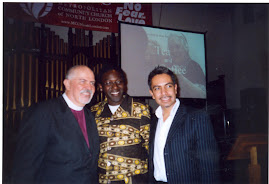International Lesbian and Gay Association (European Region)
Statement by Rowland Jide Macaulay on Sexual Orientation, Gender Identity & Human Rights
Presented at the United Nations Human Rights Council, Geneva, 9th June 2010.
Mr. President, distinguished delegates,
My name is Rowland Jide Macaulay, I am an ordained reverend with the Metropolitan Community Church, founded in 1968. I grew up and studied both in Nigeria and the United Kingdom. I am a Clergy and Human Rights Activist, I have focused my career to support Lesbians, Gays, Bisexuals, Transgender and Intersex (LGBTI) people who have been alienated by society, tradition, culture, religion and State government.

In 2006 I started in Nigeria the House of Rainbow Metropolitan Community Church. This organisation is not a pressure or political group, our focus was based on religious equality of all persons against injustices. We are primarily a Christian group, supporting LGBTI people of all faith to reconcile Sexuality and Spirituality.
In February 2007, I presented a paper rejecting the attempts to introduce the Same Sex Prohibition Bill 2006, and have consistently spoken out against the injustice towards LGBTI people in Nigeria and through the rest of Africa.
By 2008, I became recognisable for my work and support for LGBTI rights. My life was endangered. I became a scapegoat of the Nigerian Media, which published many headlines, with my name, photographs and home address which threatened my safety and incited ordinary citizens to attack me and our members. My home was vandalised beyond recognition and looted of every valuable item. I faced daily harassment and verbal abuses from my neighbours and at random from people in the streets. I was subjected to hate and received numerous death threats, my family members in Nigeria and abroad also received death threats and malicious abuses.
On the 14th September 2008, after numerous and unethical media intrusion of our organisation and my work in Nigeria, I was forced into exile to the United Kingdom. Since arriving in the UK, the Nigerian media continued to write sensational stories, jeopardising any possibility of my returning safely to Nigeria. I continue to receive hate mail and death threats. My father who lives and works in Nigeria is continually harassed and receives homophobic abuses and insults.
In 2008 we were forced to close the physical presence of our church. More than 11 of our members were attacked, several were evicted from the homes, rejected by family members and some fired from their employment. We have been unable to continue the important work of reaching LGBTI people with other interventions including HIV prevention work. Many members of House Of Rainbow now seek asylum in Europe with little hope of being accepted as legitimate claimants. Many have been returned to face serious hostilily and danger which could cost lives.
 Homosexuality in Africa has been blamed on Western European influence. Yet homosexuality has been present in the African culture throughout history, and without exception the laws criminalising homosexuality on our continent are foreign imports, brought by the injustice of colonialism.
Homosexuality in Africa has been blamed on Western European influence. Yet homosexuality has been present in the African culture throughout history, and without exception the laws criminalising homosexuality on our continent are foreign imports, brought by the injustice of colonialism.The struggle against HIV/AIDS is also undermined by criminalization of same sex union. Former president of Botswana Festus Mogae and UN Special Envoy for HIV/AIDS in Africa Elizabeth Mataka, have spoken out firmly and forcefully, against criminalization of homosexuality in Africa.
Mr President, we are deeply shocked and saddened by the killing of Floribert Chebeya, a few days ago, one of the most prominent and courageous Human Rights Activists in the Democratic Republic of Congo. We call on the Human Right Council to endorse the appeal for an immediate, credible, impartial and independent investigation into this killing. Speaking recently in Malawi, UN Secretary General Ban Ki Moon called for an end to criminal laws against homosexuality. We commend the commitment of Mauritius during its UPR to decriminalise homosexuality, and the position of Rwanda that same-sex conduct will not be criminalised since it is essentially a private matter.

I urge States to return to the values of dignity and respect for all peoples, and to:
• urgently repeal discriminatory laws and legally reinforce security for LGBTI people and the full protection of human rights in the context of HIV/AIDS;
• address underlying prejudices and discrimination through education programs and community dialogue, to help create a more supportive environment for LGBTI persons;
• promote media training, explicitly designed to discourage attitudes of discrimination, incitement to violence and stigmatisation, especially in respect of HIV/AIDS.
I hope that this brief account gives a clearer understanding of the struggles we share in seeking respect for our rights, our dignity and our lives. Thank You.




2 comments:
It´s a very powerful presentation, congratulations. You put the eye and now the ears in the focus all governments need to know. Hugs.
A clear and strong statement! Very well done.
I am proud to consider you a friend. I am priviledged to have physically embraced you before, and I do so, metaphorically, again.
Post a Comment